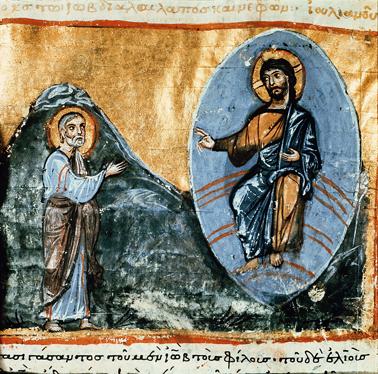
Haggai 1:15b-2:9 and/or Job 19:23-27
What It’s About: Haggai is a tidy little book, often overlooked in the canon, while Job is of course one of the most distinctive books in the Hebrew Bible. They both have to do with suffering and its endurance; as the section of Haggai that comes just before this week’s reading tells, the book (and the prophet himself) is set in the aftermath of the Babylonian catastrophe, when the temple was in ruins but the people had been allowed to return to the land. The book generally, and this section of Haggai specifically, is about the aftermath of disaster and the suffering–physical and psychic–that can follow destruction. Job’s suffering, meanwhile, is much more personal. Job, by this point in the book, has endured much calamity, and his exclamation here in chapter 19 is a defiant one. We could call it the “anger” part of the stages of grief. Verse 25 is often cited as an expression of faithful endurance, but that way of thinking about it misunderstands the text, as we will see below.
What It’s Really About: “I know that my Redeemer lives” is often cited as a great statement of faith: “I am not worried about my current state, because God is still God.” This is a very poor understanding of this verse, though, because it misunderstands the term “redeemer” in particularly Christian terms. Christianity has made the word “redeemer” something to do with salvation; Jesus redeems persons from sin. But that’s not the meaning of the word here in Job, at all. Here, a redeemer is something like an advocate. (The NRSV has a note that gives an alternate translation of “Vindicator”). The redeemer is the one who will stand up for Job, perhaps in his absence (after he has died) or when “in my flesh I will see God.” This latter statement is a little unclear in the Hebrew, but this too has usually been misunderstood as a statement of faith. Instead, it’s a demand, and it’s Job’s way of angrily demanding his moment before the one who has mistreated him–God. Job here isn’t expressing faith in God’s eventual purpose and plan; Job is angrily asserting his righteousness (which we know is intact, because of the way the book is narrated), and demanding to be vindicated before God. This is a very understandable response to his suffering; he wants the suffering to end, but more than that he wants justice for the one (God) who has caused him to suffer unjustly.
What It’s Not About: It’s striking, reading both Haggai and Job, how distant these responses to suffering are from the ones usually put forth by Christians today. Today, Christians tend to advocate for the elision of the entire range of responses to suffering, into a single “God is in control, you just have to stay faithful” response. There is not much room in Christianity for recognizing suffering, naming it, contending with it, being angry about it, or challenging the righteousness of it. We tend to move straightaway to acceptance–as an act of faith–of suffering. Haggai’s point is something like “yes, you’re suffering, just look around, but God is still with you in the midst of it,” which is very different from “this is God’s will, deal with it.” And Job’s point in this passage is defiant anger, which is a response many of us know in the midst of suffering. These two passages critique contemporary Christian responses to suffering as profoundly un-biblical.
Maybe You Should Think About: The world seems to be more full of suffering than ever–or perhaps we are simply more aware of it than ever. Migrants drowning in the Mediterranean or the Caribbean while seeking a better life, children dying in Syria or Nigeria or Colombia because of the actions of governments or factions, people suffering because of the effects of climate change–there are so many examples of this every day. The typical Christian response–to appeal to God’s will and God’s purpose as the grounds for enduring suffering–is a bankrupt ideology, and these passages from Haggai and Job underscore that a biblical theology of suffering is much richer and deeper than the one we usually employ.
What It’s About: This is an interesting passage. It demonstrates a lot of anxiety about the parousia–the second coming of Jesus. It seems that some people had already been claiming that “the day of the Lord is already here,” a kind of realized eschatology. Rather, the author of 2 Thessalonians (most scholars don’t agree that Paul wrote 2 Thessalonians) thinks that Christians still need to wait on Jesus’ return. This concern with steadfastness reappears later, in verse 15, where the author exhorts his audience to keep the traditions they had been taught.
What It’s Really About: Both 1 and 2 Thessalonians are deeply concerned with the question of time. What does God’s timeline look like, and where are we on it? This was a big question for Paul in 1 Thessalonians (especially chapter 4), and here the author of 2 Thessalonians takes it up again. This is a common question in 2nd and 3rd generation Christianity; the earliest Christians expected Jesus’ immanent return and Jesus’ failure to materialize led to a lot of confusion and anxiety. The appeal to tradition in verse 15 can be seen in this light; it was only when it became clear that the parousia wasn’t happening right away that Christians turned to tradition and institution-building as part of their communal life. 2 Thessalonians 2 is doing both of these things; it is addressing questions of the eschaton while also pointing the way forward in a kind of sustainable Christianity that doesn’t expect Jesus’ return at every moment.
What It’s Not About: Verses 6 through 12 are interesting! They always leave out the most interesting parts. Lawless one! Mysterious restraints! Wicked deception!
Maybe You Should Think About: The obsession with God’s timeline is not unique to early Christianity. Even now, twenty centuries later, Christianity is still rife with speculation and conjecture about when and how the parousia will occur. The only reliably safe thing to say is that it has not happened yet, and that 100% of those who have predicted it have been wrong. I wonder what the author of 2 Thessalonians (or Paul himself) would say if he (they) knew that we would still be here in 2016?
What It’s About: What a fascinating exchange. The setup is that a group of Sadducees (who were the more conservative, establishment-oriented faction of religious leaders) came to Jesus asking about resurrection. But the context for the question was a complicated case law instance of levirate marriage. Levirate marriage is the custom (best known through the awful story of Onan) whereby a dead man can still bear children. If a couple is married, and the man dies before they have children, then the man’s brother is obligated to “marry” (in a levirate sense) the widow (his sister in law) and impregnate her, and the children would be considered to be those of the dead man. There are obviously many awful aspects to this, but one of the implications is that the woman would have had at least two “husbands” in her lifetime. The Sadducees seize on this as evidence that the resurrection is a bad idea, since in a resurrection the woman would be polyandrous.
What It’s Really About: This isn’t really an opportunity for Jesus and his Sadducean interlocutors to question the practice of levirate marriage, although we might wish that they had made it so. Instead, it becomes a reflection on the nature of a bodily resurrection, and whether we are raised from the dead into a fullness of life, or whether our post-resurrection “life” is of a different quality. Jesus’ response is that life after death is different in nature (which must come as a relief to the poor woman who had been passed from brother in law to brother in law in an attempt to impregnate her). This very practical question becomes an opportunity for Jesus to make a spiritual and theological point: that God is the God of the living.
What It’s Not About: Our concerns are our own, and we cannot expect Jesus or anyone else from another time and place to share them. But I do wish that Jesus had taken a moment to challenge the notion of levirate marriage generally. We can’t expect Jesus to have been a full-blown feminist, but the institution of levirate marriage seems to have slipped past him completely unchallenged. Which leads me to ask….
Maybe You Should Think About: If (from our perspective) Jesus dropped the ball on challenging the institution of levirate marriage, and he’s Jesus, what cultural norms and practices do we neglect to challenge, simply because we cannot see that they are bad, dangerous, unfair, or exploitative? What do we miss about our own world and culture because we are too immersed in it to notice? The dangerous effects of affluence? Various forms of privilege? The way we treat children? The insidious workings of violence? Twenty centuries on, what will people read from us and ask, “how could they have missed that?”










